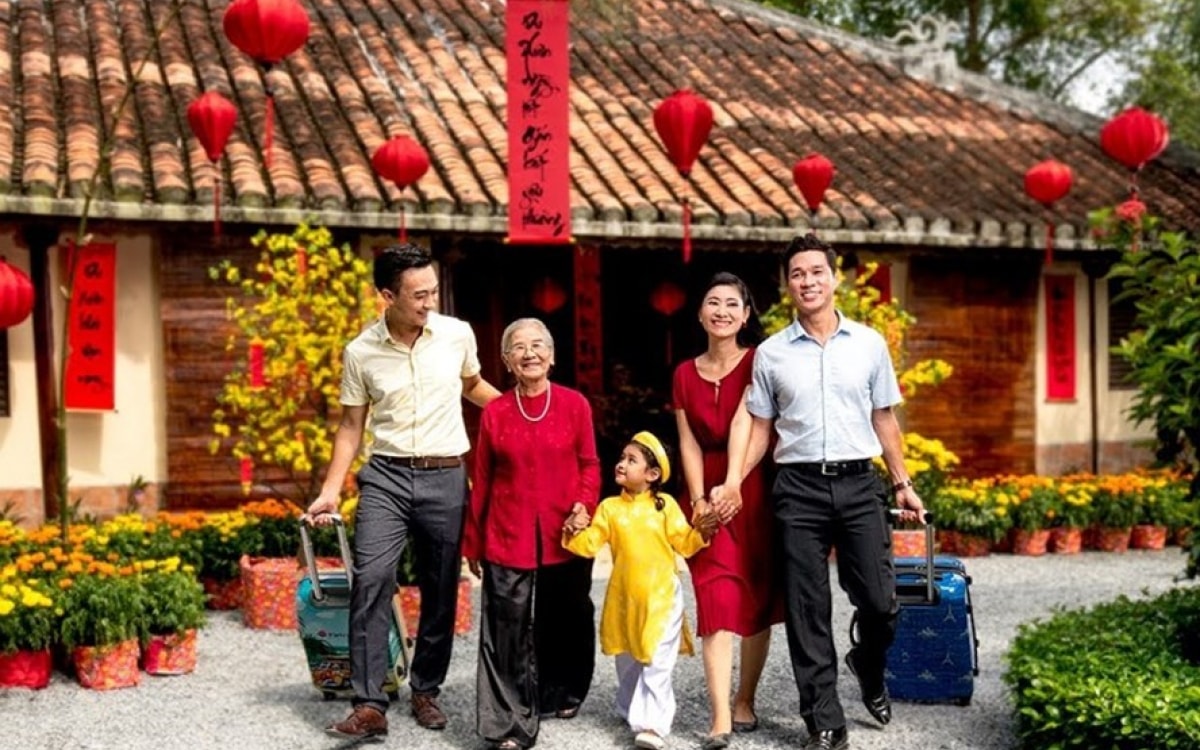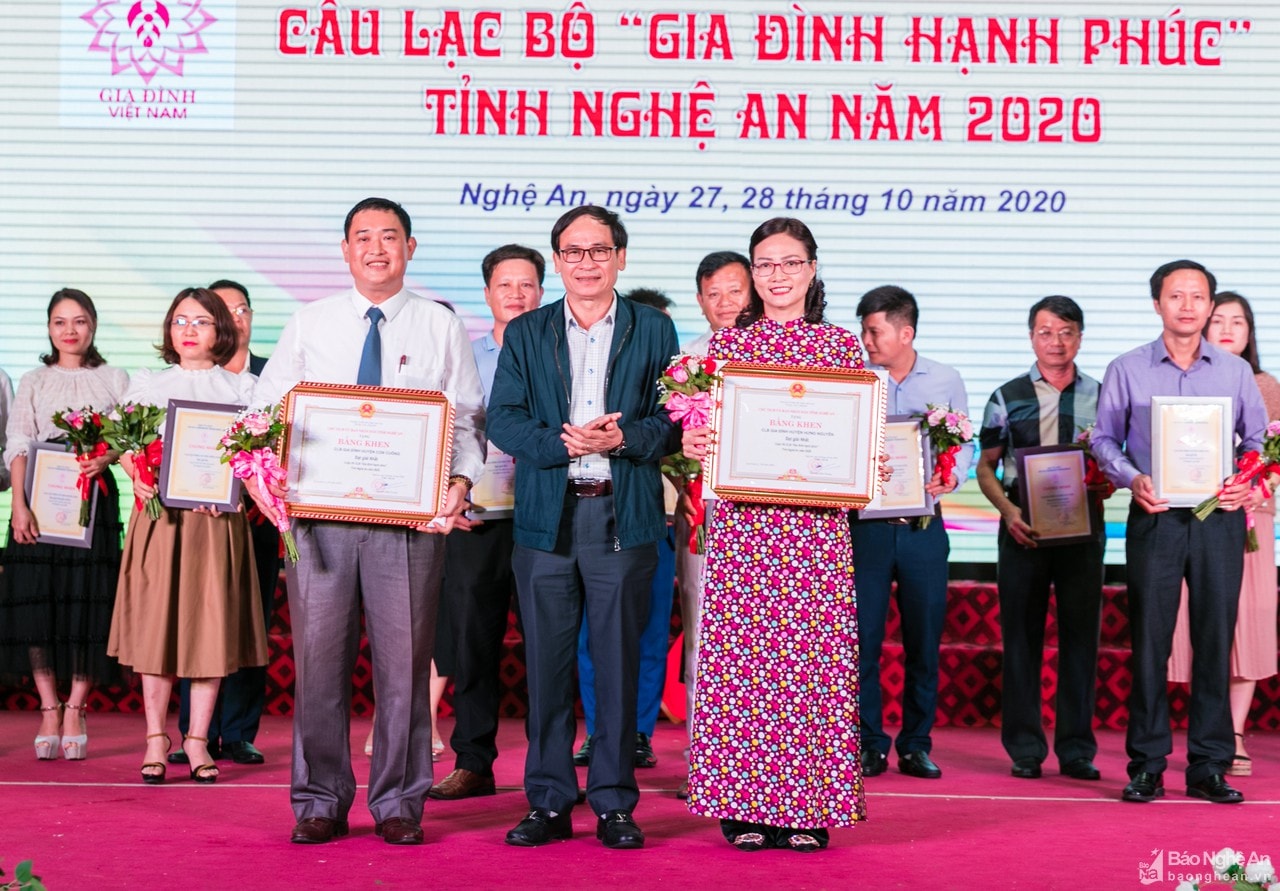Fostering traditional values of Vietnamese families
(Baonghean.vn) - On the occasion of summarizing the Vietnam Family Development Strategy 2012 - 2020 in Nghe An province, Nghe An Newspaper had a conversation with Ms. Tran Thi My Hanh - Member of the Provincial Party Committee, Director of the Department of Culture and Sports about the achievements as well as difficulties, shortcomings and orientations in the next period.
 |
| Illustration photo. |
PV: Madam, we have just summarized the Development Strategy.Vietnamese family2012 - 2020 in Nghe An province. As Deputy Head of the Provincial Steering Committee for Family Work, could you please tell us what the purpose of this strategy is?
Ms. Tran Thi My Hanh:On May 29, 2012, the Prime Minister issued the "Vietnam Family Development Strategy to 2020, vision to 2030", with the aim of thoroughly instilling awareness in Party committees, authorities, cadres, party members and all people about the position, role and importance of family and family work. This is identified as the driving force for socio-economic development, building and defending the socialist Vietnamese Fatherland. Building families according to the criteria: few children, well-off, progressive, happy; preserving and promoting the fine traditions of Vietnamese families, eliminating backward customs and practices, selectively absorbing values suitable to the trend of international integration and the period of industrialization and modernization of the country. From there, creating a clear change in stabilizing, consolidating, developing families and family work, especially at the grassroots level and in residential communities.
 |
| Short play participating in the 2020 Nghe An Province "Happy Family" CBL Contest. Photo: Duc Anh |
PV: In terms of time, the implementation of the Vietnam Family Development Strategy has been completed. So, can you highlight the outstanding results that Nghe An has achieved?
Ms. Tran Thi My Hanh:After nearly 10 years of implementation, the Provincial Party Committee, People's Council, and People's Committee have issued many documents directing the implementation of the Strategy and family building work in the province and achieved important results. Awareness of family work has been significantly raised, and is identified as an important task in the construction and development of economy, politics, culture, society, national defense, and security. Party committees, authorities, political and social organizations at all levels have paid attention to leading and directing family work with many specific policies, regulations, and guidelines, which have been supported by all classes of people. Programs and projects on family have been organized and implemented in conjunction with the Movement "All people unite to build a cultural life" and the National Target Program on building new rural areas and civilized urban areas with many good models and effective methods.
Many localities and units have paid attention to allocating funding, organizing training courses, and fostering professional skills for staff working in family affairs at the grassroots level. Attention has been paid to family tradition education, protection, care and education of children, care and support for grandparents and parents. The model of small families is increasingly being replicated; the work of caring for and educating children and protecting the elderly is increasingly widespread.
The work of propagating and educating ethics and lifestyle in the family; the Law on Marriage and Family, the Law on Prevention of Domestic Violence, the Law on Gender Equality has been paid regular attention and responded positively by all classes of people. The quality of building cultural families, clans, residential areas, agencies and cultural units has been increasing, many typical models of cultural families and cultural clans have been built, contributing to preserving and promoting the national cultural identity, building Nghe An people with ethical standards, promoting the spirit of loving the homeland and country in the period of innovation and integration...
 |
| Many localities and units have paid attention to allocating funding, organizing training and professional development for staff working in family affairs at the grassroots level. Photo: Duc Anh |
PV: The results achieved are undeniable. However, we can easily see that recently, the issue of marriage and family happiness has many concerns. For example, the number of divorces is increasing; the phenomenon of women leaving their husbands and children going abroad to marry... What are your thoughts on this issue?
Ms. Tran Thi My Hanh:The family is a cell of society, so it is inevitable that it will be affected by social life. In other words, the fluctuations in economic, cultural and social life today have more or less affected family life. At times and in some places, domestic violence still occurs, there are extremely serious incidents; the traditional family model is at risk of being lost. The degradation of morality and lifestyle is also increasing, especially among young people. The rate of divorce among young couples is increasing, leading to the consequence that the number of abandoned and uncared for children is increasing exponentially...
It can be said that this is an alarming situation, which requires the participation of the whole community and society. With the responsibility of state management of family affairs, we always strive to advise and closely coordinate with relevant departments, branches and localities to effectively implement the work of preventing and combating domestic violence, promoting and educating ethics and lifestyle in the family, implementing the set of criteria for family conduct...
PV: Returning to the Vietnam Family Development Strategy 2012 - 2020 in Nghe An, can you analyze more clearly the difficulties and shortcomings in the implementation process?
Ms. Tran Thi My Hanh:As a standing agency, we, more than anyone else, clearly recognize the difficulties and shortcomings in implementing the Vietnam Family Development Strategy in Nghe An. First of all, some Party committees, authorities, and grassroots organizations have not really paid attention to and recognized the importance of family work. Therefore, the results achieved are not uniform, not deep, and not very effective. Secondly, there have not been many comprehensive research projects on family work in Nghe An, and the research results, finding solutions to challenges in the family field, and forecasting changes in the family in the new period have not been applied.
Limitations in implementing family work are still slow to be overcome; the assessment and recognition of the title of Cultural Family are sometimes and in some places not strict. Some backward customs and practices still exist in remote areas, leading to the existence of patriarchy, male preference, female contempt, early marriage, and multiple births. The state of moral degradation, lifestyle and social evils such as drugs, prostitution, and trafficking of women and children are affecting the building of a prosperous, equal, progressive and happy family. Relationships in the family, community and society have more or less changed.
PV: So, what are the causes of those difficulties and shortcomings, madam?
Ms. Tran Thi My Hanh:First of all, objectively, Nghe An is a large province, with 11/21 mountainous districts and towns, 115/480 extremely disadvantaged mountainous communes, and ethnic minorities accounting for 15.3%. There are still backward customs in the lifestyle of some communities. Along with that, the explosion of information, especially social networks, and the penetration of many types of toxic cultural products, bad and poisonous information have affected the ideology, ethics, and lifestyle of a number of cadres, party members, and people, especially students.
Subjectively, the leadership and direction of family work by local Party committees and authorities in some places is not clear; family building is not yet determined to be the responsibility of the entire political system and the entire society. Family education, providing knowledge about fatherhood and motherhood, pre- and post-marriage education, and family behavior skills are not given due importance. Many families, due to focusing on economic activities, forget to care for, educate, and protect their members, especially children and the elderly. Handling of violations of the Law on Prevention and Control of Domestic Violence; Law on Marriage and Family; Law on Gender Equality, and Law on Children is not strict...
PV: Can you share information about the key issues that need to be implemented as we continue to implement the Vietnam Family Development Strategy in the new phase?
 |
| Leaders of the Provincial Party Committee's Propaganda Department awarded the First Prize at the "Happy Family" Club Competition in Nghe An province to Con Cuong and Hung Nguyen districts. Photo: Duc Anh |
Ms. Tran Thi My Hanh:To continue promoting the effectiveness and overcoming the limitations and shortcomings, in our opinion, the implementation of the Vietnam Family Development Strategy to 2020, with a vision to 2030 in Nghe An province must be closely linked to the movement "All people unite to build a cultural life", the National Target Program on building new rural areas and civilized urban areas. At the same time, improve the leadership capacity of Party committees, management and operation of authorities at all levels; the coordination of departments, branches and localities in implementing the Family Work Strategy in the new period. Improve the quality and effectiveness of training and fostering for the team of leaders, managers, consultants and staff working in family work.
In addition, it is necessary to have appropriate policies, mechanisms and strategies for family work; invest in key and comprehensive research projects on family work in Nghe An to apply in practice and forecast changes in families in the new period. At the same time, strengthen education on the good traditional cultural values of Vietnamese families to nurture personality and contribute to protecting and caring for children and the elderly. To do so, it is necessary to organize propaganda in appropriate forms, launch many movements, programs and competitions on family work associated with policies, laws and regulations on marriage and family; gender equality; prevention and control of domestic violence. Compile and publish propaganda materials, mobilize all people to participate in response; promptly prevent and handle violations in family work, gradually eliminate backward customs, practices and social evils...
PV: Thank you!
